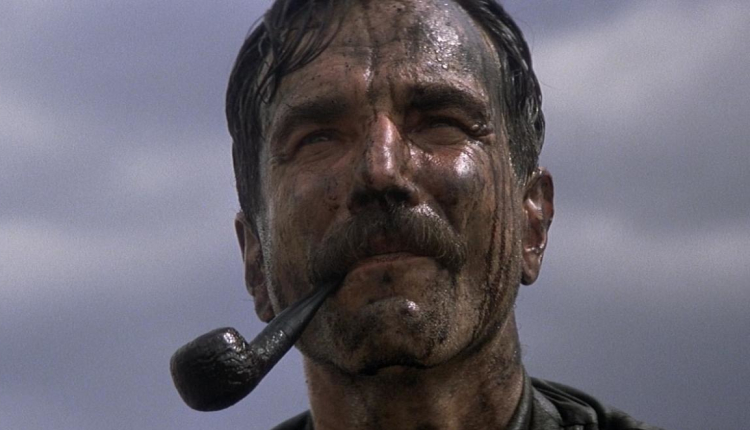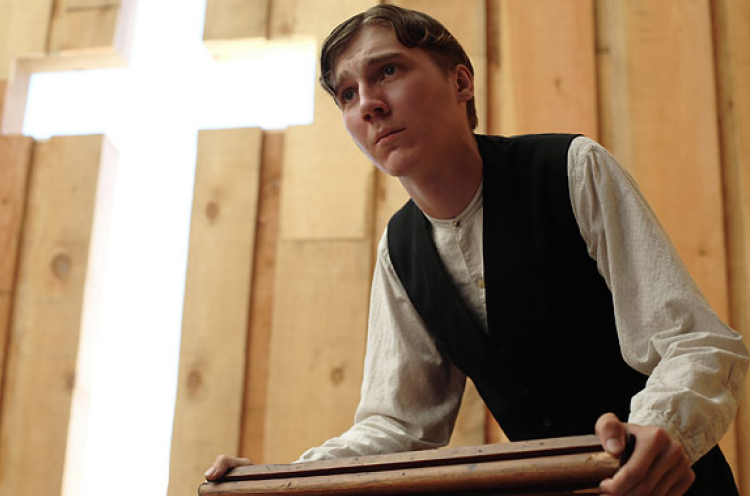Is There Will Be Blood a Comic Masterpiece? | Analysing PT Anderson’s Classic 10 Years On
There Will be Blood taught me that a profound movie can also be a remarkably silly one.
10 years ago, I was just a few months out of college, and met up with my old Film Studies class to watch PTA’s latest film on its first day. We were all so damn excited. A Great Movie – Capital G Great – was expected. Weight and themes and a central conflict full of serious serious drama. Then I remember being in the cinema and a little after the half way mark, it became ever so slightly daft. My gut twinged a little. This was not the great big Citizen Kane of the modern era that I’d been promised. And then it got worse. By the end of the movie the audience were laughing openly as up on the screen Day Lewis pranced about like a panto villain throwing skittles at a squealing Paul Dano. And I laughed too.
After we left I was appalled, and me and my friends sat for three hours in the Long Stone arguing about the movie. I remember going to get a round of drinks when the barman asked
‘Well, is it good or not?’
‘What?’
‘The Day Lewis movie you’re all getting so worked up about, is it actually good?’
It took a re-watch a few weeks later, and with it came a big change in how I look at films, but I can now confidently say (if that barman happens to be reading this and still curious for an answer): yes, it’s a completely unique masterpiece. Actually I’m a little bit nuts about this movie. Two years later I even made a 60 second version (which *cough* was nominated for an Empire movie award, and was praised by Edgar Wright as ‘very funny’ – oh why here it is in case you need a minute long refresher on the plot. See here)

The setup for the movie is ostensibly quite simple – an extremely determined ‘oil man’, Daniel Plainview, tries to drill all the oil from a small rural town, Little Boston, but has to contend with a petulant young preacher, Eli. What makes the movie so complex, strange and unique for me is the way its tone evolves and ‘snaps’ throughout the movie. It’s effectively a movie where both the hero and the movie become hysterical. In the first half, as we follow Daniel’s early career and his campaign in Little Boston, the tone is evenly split between fitful activity and a sad sense of dread. Daniel is so deeply focussed on the task, it’s like every element of his personality is tightly wound around his ambition.
Then, mid-way through the movie, he’s offered a fortune for the oil he’s discovered. Instead of happiness, he mutters “What else would I do with myself?”. He stares at the man from Union and calmly tells him how one day he’s going to slit his throat. It’s then, at that precise moment, that we first see that he is absolutely insane. The urge to acquire capital has bolstered him together, kept him going through a life devoid of warmth or real human connection. It made him drag himself across miles of desert with a broken leg. Now that that knot at the heart of him is cut loose he unravels into bizarre acts of madness, and the ‘knot’ of the film – the central order that’s riveting it together – it starts to unravel too. The film slips into a comic tone, as Daniel’s personality implodes in front of us.
After he’s humiliated by the preacher in an hilarious and dramatic baptism scene, Daniel is well and truly broken. The final sequence takes place 15 years later in Daniel’s vast mansion, where he has become a grotesque joke of himself – a bug eyed, roaring, theatrical monster who sits around shooting at random things in his house or drinking until he passes out on his very own bowling lane. The other characters drift in but it’s odd – like an ante-room to the rest of the movie. Kubrick was a huge influence on the movie, and I can’t help but wonder if this trick was inspired by the space room at the end of 2001. It feels like a surreal comedy farce that someone would make as a short film sequel to the real movie years later, oddly dislocated from the rest.

But what exactly is it getting at? Sim City taught me a valuable lesson that’s relevant here. You know when you’re playing it and you’re struggling and struggling to get your city together. You’re anticipating this moment where things will start clicking into place, it’s the goal of the game after all, but then – well then you keep playing, you begin succeeding and… it’s all so dull. I mean – in life, not just in that game – we have a narrative where you work hard to achieve something, and when you attain that goal all of society gives you a gold medal and you’re on a podium and you’re happy forever and ever after. Midway through TWBB Daniel is given that ‘gold medal’ – he’s offered more money than he could ever spend. Rather than validate his existence, success suddenly terrifies him – where do you actually go from here? What do I do without my drive?
It’s also about how we want these great big conflicts and we want these great big endings in our lives that will give us purpose but they don’t really materialise. In fact the real story of our lives, the real meat of it, might have been happening right in front of us all along. After watching it too many times to count, it’s not the fight with Eli or the oil discoveries that hit hardest, but the story of Daniel’s adopted son HW: a little boy who has to grow up too early, who wants the man he admires to love him back, and who finally faces him with astonishing courage only to be laughed at and insulted. HW is Daniel’s one chance at having a soul, and we spot tiny glimmers of warmth in their interactions, only for it to be snuffed out by Daniel’s absolute dedication to ‘competition’.
On a rewatch there are so many more delightfully funny moments. I feel ignoring the comic quality of TWBB is to miss a lot of what makes it so unique. Daniel is a character who categorically despises ever being less than powerful in a room. His authority is an obsession. Eli is a man opposite him, a weaselly, arrogant, whiny little wretch who, due to his ‘Church of the third revelation’, is an authority that Daniel must navigate. Their scenes together are comic gold, as Daniel struggles to hold his tongue – as fate makes it necessary, over and over again, that Daniel tolerates this whimpering idiots authority over him. I mean, if you’ve time, rewatch this baptism scene at once both hysterically funny, yet tinged with sadness.
Also let’s talk about Blood. There is not, at first glance, a lot of it actually. Early critics were confused about the title, but it seems clear on reflection, that blood is really the central metaphor for both oil and religion – the blood of the land vs the blood of the lamb. The hymn ‘Power in the blood’ is sung several times throughout, and Eli’s sermons fixate on the miraculous potential of this ‘blood’. Visually, the oil Daniel is after is often shown in ‘blood-like’ ways, and by the end it’s even talked about as such. Daniel tells Eli ‘I drink the blood of Bandy’s track every day’ referring to an oil deposit in the hills.
At the time some reviewers saw it as a George Bush allegory – that two of the biggest forces in American life, oil and evangelical religion, had come to fruition in an insane yet determined president and that this was a movie reflecting on the genesis of both. To back this up they even brought in that Daniel’s son is called ‘HW’ as a reference to the previous Bush president. Looking back it’s a theory you really have to squint to make work. That said, as a reflection on how powerful madmen in both religion and capitalism are rewarded by American society, it was quite timely.
One final little TWBB detail I love. One day on the set of No Country for Old Men, the Coen brothers were all set to film a big scene where Josh Brolin discovers the money in the open desert. As they went to film, they spotted a huge plume of smoke on the horizon, drifting towards their set. They waited but it still remained, so they sent a scout over. He came back with the news that it was Paul Thomas Anderson testing out his pyrotechnics for the huge oil derrick fire in TWBB. The Coens suspended shooting for the day. The two films would compete fiercely for the Best Picture Oscar, but the legacy of both is quite interesting. It’s really intriguing how little impact There Will Be Blood has had. It’s undoubtedly one of the greatest movies of the past ten years, and yet I can’t think of a single film that shows its influence. The closest would be the fact that seeing it goaded Tarantino into upping his game and making Inglorious Basterds, but that film is worlds away from TWBB. In contrast you can see how No Country paved the way for a new vision of the western set in the modern west – Justified, Hell or High Water, Logan and even True Detective owe a certain debt to its reimagining of the genre.
For me though, what’s always stood out about PTA’s masterpiece is that daring use of comic tone to ultimately convey rich and profound ideas about power and identity. That’s what makes it so mystifyingly singular – an anomaly in film history that sits on its own as the greatest movie of this century so far.

